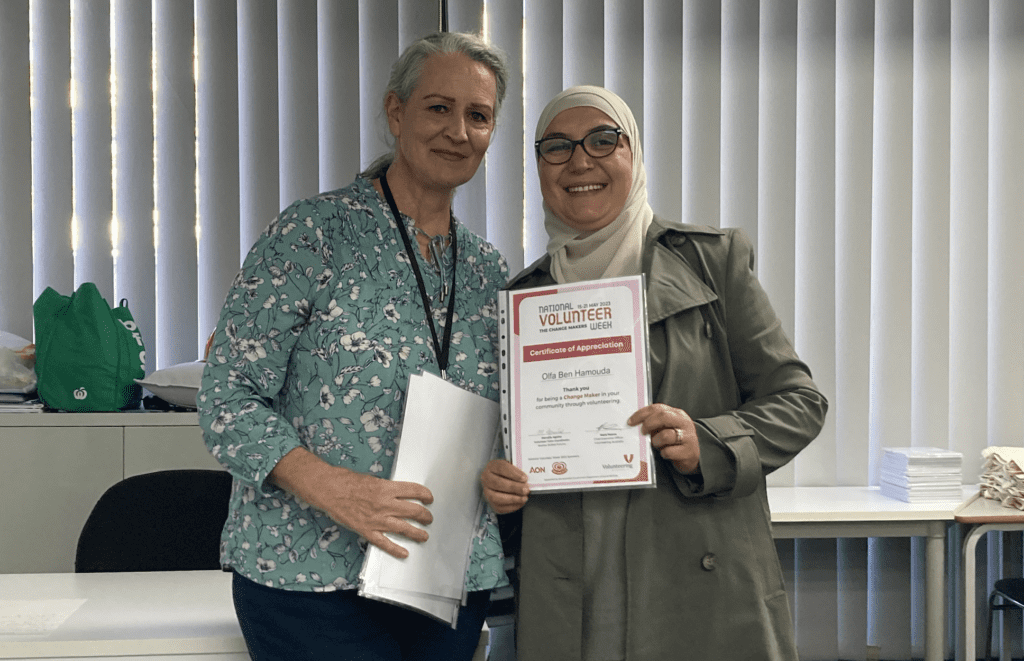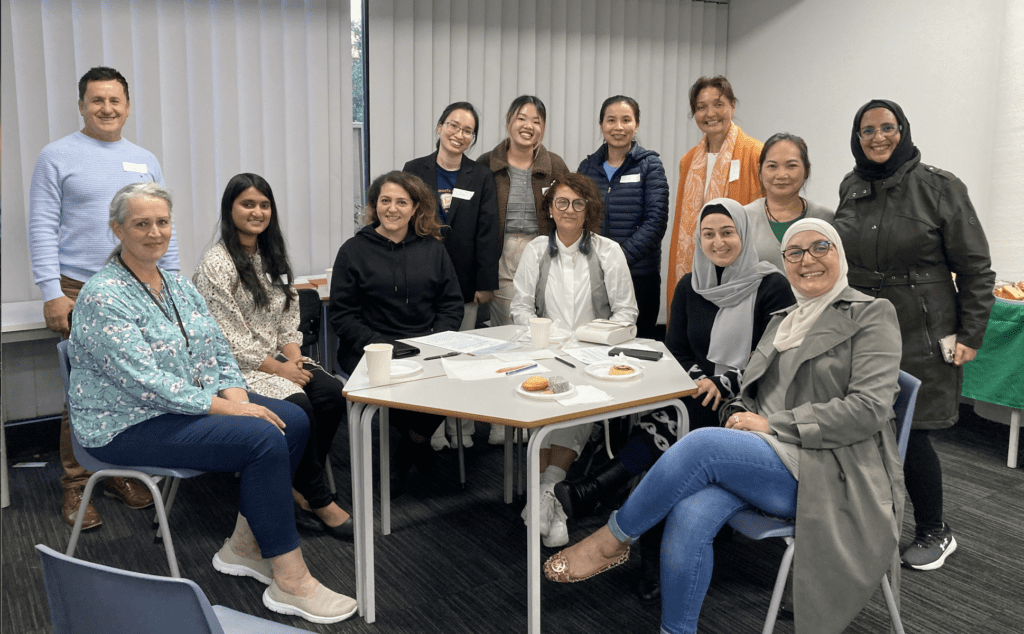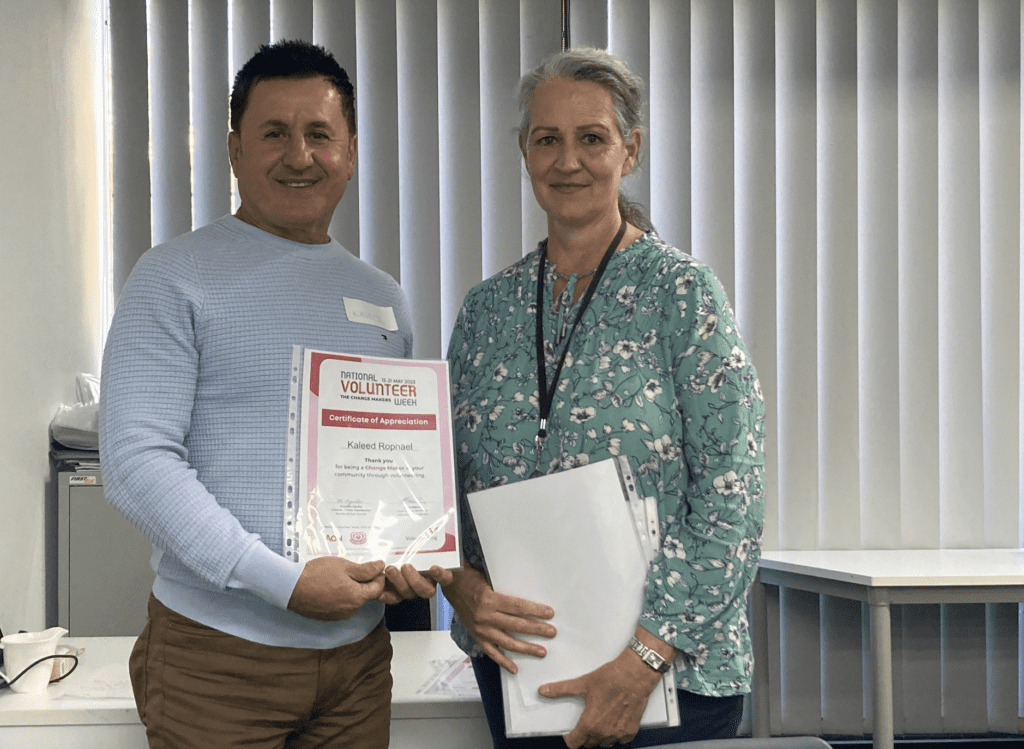Marcella’s silver service

As the Navitas Skilled Futures AMEP delivery reaches its 25-year anniversary, it’s a perfect time to look back and reflect on the people that have made a difference. Navitas could not do the good work it does without the support and dedication of committed staff and volunteers, collectively dedicating many years of service to helping better the lives of migrants and refugees in Australia. By Rebecca Foreman
There are few stories quite as exceptional as Marcella Aguilar’s, who runs the Volunteer Tutor Scheme, a sub-program of the Adult Migrant English Program (AMEP). Coincidentally, Marcella is also celebrating her silver anniversary of working at Navitas. She was a finalist in Navitas’s inaugural Inspire Awards in 2021, in the ‘Expert’ category, which recognised her expertise to positively impact Navitas in building the VTS from scratch, and has worked across NSW and the ACT to unite people and help them achieve their goals.
Can you tell us how you started at Navitas?
I started at Parramatta 25 years ago, and worked there for 13 years as a Trainer and Initial Assessor, as well as managing the childcare placement and scheduling – where I had to liaise with childcare staff and trainers. Then I was moved to Campsie/Burwood where I worked for six years as an Assessor. I assessed every client in the college and heard their stories, some really harrowing. It was lovely to know all of our students and say hello to them in the college. I also continued to have contact with the clients through individual assessments in speaking skills that I would conduct for trainers to assist them with class testing. Finally, I moved to Bankstown in the Volunteer Tutor Coordinator role that I am currently doing, where I have worked for six years.
(Marcella added that she has also worked in a number of other roles throughout her 25-year tenure at NAVITAS, including: Internal auditor, OH&S Officer Parramatta College, First Aider at the Bankstown College and Mental Health First Aider at the Bankstown College.
It’s amazing to be able to connect with people one on one and see the difference you’re making.
Tell us about the Volunteer Tutor Scheme at NSF
When I started in my role as VTS, I had no students and no tutors, but I have grown the program to over 200 tutors matched with students. Basically, people send in an expression of interest to volunteer themselves as a tutor to someone who is studying through the AMEP. It comprises a huge area: Sydney Southwest, Bankstown, Cabramatta, Fairfield, Parramatta, Campbelltown, also Canberra. Since 2017, I have delivered training to over 600 tutors.
How does the program work?
I do 16 hours of training online to prepare volunteers for tutoring. From there I do bespoke matches between the student and volunteers, depending on the need, which can take a lot of time. For example, if a mother wants to connect with the community, not necessarily find employment, I might match them to someone similar who can connect and help them get out of the house, meet for coffee and talk. While others may be looking for employment, so I can find someone who’s working, and not only provide English language tuition for them, but a form of mentoring and assisting with finding work. Lots of our clients have been able to find jobs this way. There’s a lot of support and I think because the volunteer program is only one hour a week and flexible, people use this time to really get what they need.
” I provide individualised ongoing support for the tutors after the training. This is intensive work because each tutor has a different student with individual needs and specific resources are sourced and provided to support the tutors with their teaching.”
What are some of the needs your program facilitates?
So many. For starters, passing the Australian citizenship test is one of the needs we’re finding very popular right now because it’s become tough to pass. It’s changed a lot recently and you can imagine for humanitarians coming to Australia, a safe place to call home, passing the test and becoming citizens is very important for them. There’s a high number of female humanitarian entrants in Fairfield and Liverpool on my waitlist, primarily from Iraq, Syria, Afghanistan – mostly Arabic nations – so the need to supply them with bilingual tutors is also high right now.
We have to consider that many of our clients come to Australia, they may be illiterate, may have been injured in the wars, they are often minority groups in their home countries or villages and have been persecuted in their countries before leaving or fleeing, so we have to facilitate lots of medical appointments where a bilingual (often) female can attend alongside them.
“I am most proud of the connection I make with people (clients, tutors and staff) and the work I do to try and improve the lives of new arrivals who are settling in the community. I am rewarded by making a difference in people’s lives.”

Tell us why Navitas and the VTS have kept your attention for so long?
This program is so bespoke and can really be tailored to the individual’s needs, goals and wants, so in that way, this program makes such a difference to people’s lives. I don’t think many other countries offer this type of thing. I’m proud of this and I feel like I’ve been able to take this program to another level in terms of the way we look at the individual’s needs. Before it was very language focussed and general English, but I do encourage every one of our AMEP students to get themselves a tutor to help them in particular areas where they may be lagging. Some students might be lagging in literacy, or keeping up in class, so a tutor can focus on the individual needs of the student and achieve their goals.
What have you gained from this program?
It’s an amazing program, and training and teaching people about teaching English is something I just love to do. Connecting students with tutors and then seeing the firsthand results, I’ve gained so much insight and feedback about what a difference that makes to a student. I’m also involved in the promotion of the VTS, working closely with marketing, doing media interviews and creating videos and animations to promote Navitas programs and projects. One example is the James Craig Tall Ship Refugee Project video which I produced, scripted and directed, as well as several other video projects for specialised Navitas courses (Foundation Skills For Your Future) and one to promote the VTS. I also worked with a graphic designer to script and create animation videos to promote the VTS and these are used at our colleges on the reception digiscreens.
“This job is varied every day and even though I have a lot on my plate managing two programs, I’ve never felt like I’m pushing papers around. It’s about connecting with people and that’s important to me, and the tutors, and the people who volunteer.“
What are some of the highlights you’ve seen over the years?
Seeing the amazing changes in people that this role facilitates is a definite highlight. For example, I have had a number of clients who have been unable to leave their homes, who, through doing this course and pairing up with volunteers, have literally changed their lives, and they’ve been able to lead fuller lives. That’s the difference for me. That’s what makes this worthwhile.
Why do you think the program is so successful?
It’s the human connection. Tutors want to see the impact that they can have on another life. It’s about making a difference!
“I have been interviewed by SBS, community newspapers and an ACT community radio station to talk about the VTS and how it helps new arrivals to Australia.”
Tell us about the tutors you’ve met throughout the years?
They are amazing. They go above and beyond, and they care so much. Obviously, they are people who want to connect with their community and want to help new arrivals. Volunteering is such a big thing in Australia, but I feel a lot of people now want to really connect with someone, and this is the perfect way to do that, and more importantly, to help someone, to make a difference in their lives, one on one. People (volunteers) want to see the impact their effort is having, and they want to learn about those other communities inside their communities: How can I understand more about these people, how can I help them?
What have the challenges been?
Pivoting during COVID to deliver online was huge – working out how the program could still be interactive and connect people with volunteers was challenging. The main challenge I have is people management, actually putting your own ego or beliefs aside and understanding people, and really listening. I’ve gotten better over the years. Managing people from all walks of life and understanding where people are coming from and what they’ve been through, especially in a class of 20 where you’ve got so many educational and personal experiences, trauma, and torture, has been a challenge, but also a delight in understanding and connecting with people. We’re all a work in progress!

What have you learned about yourself and others?
I think people need to be seen, heard and to share. I see this happening in every class and with everyone from all cultural backgrounds. I see the migrants and refugees, men and women, all want to be seen and heard. People need to open up, slowly but surely. People need support and a lot of people coming to Australia have nothing – no social network, no family. But through the program, they eventually open up when they find the support they need.
What is one thing you would like to share about the community you work with?
In Australia we’ve signed an agreement to take about 5000 refugees, and what a lot of people in Australia don’t realise is that these refugees, these migrants are here to work and work really hard, doing the jobs most of us would prefer not to do. These are people that want to start a new life, a better life for themselves and for their families, and they’ll do almost anything to earn money. Often, they’ve had to leave their countries without their paperwork, qualifications, proof of anything, so they start with literally nothing. That’s what people don’t understand.
Marcella, 25 years at Navitas, congratulations! Tell us why you have stayed so long.
Because it’s made me feel very grateful for what I have. Every day I come across people that have absolutely nothing, but they are grateful to be here, and they are still smiling and they’re happy to give, out of the nothing that they do have. It just makes you very grateful!
For more information about the Volunteer Tutor Scheme, or to register your interest, go to the Volunteer page.
*The VTS is part of the Adult Migrant English Program (AMEP) and funded by the Australian Government Department of Home Affairs.

